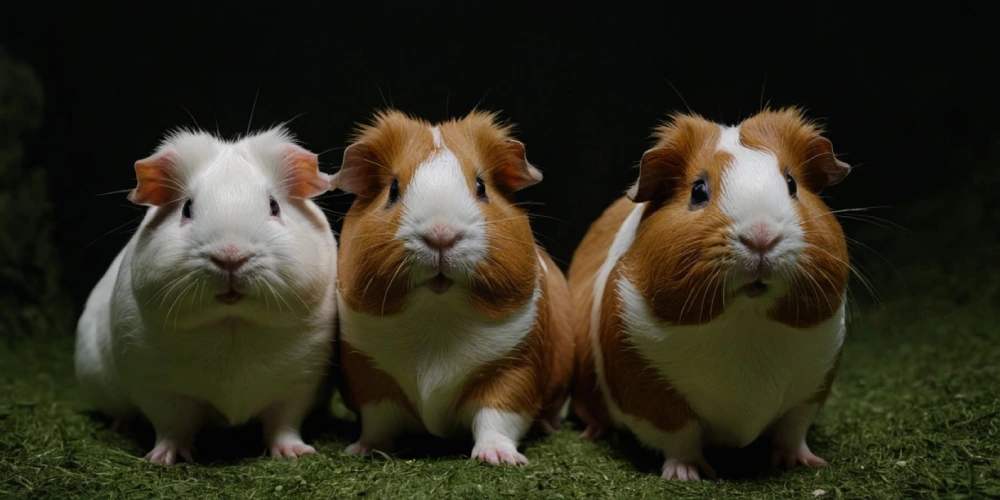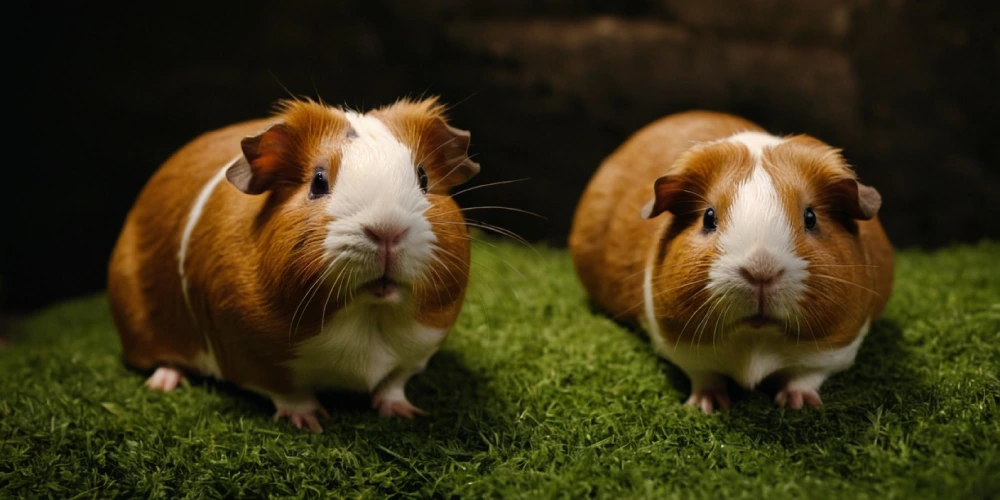
Can Guinea Pigs See in the Dark?
Miniature and gregarious guinea pigs mostly use their senses to find their way around. Many pet owners wonder whether guinea pigs can see in the dark. Understanding their vision helps you provide better care and a safe environment. Unlike humans, guinea pigs have unique eyesight adapted to their natural habitats. They don’t see like nocturnal animals but can still function well in low light.
These cute rodents have a broad range of vision since their eyes are on the sides of their heads. This trait helps them detect movement and potential predators. While their vision could be better, it works well for their needs. They rely on other senses, including hearing and smell, to supplement their vision. This article dives deep into how guinea pigs see and navigate in the dark so you can better understand your furry friend’s needs.
Understanding Guinea Pig Vision
Guinea pig vision is very different from that of humans. While humans rely on clear, detailed sight, guinea pigs depend on their ability to sense movement and light changes.
Wide Field of View
The placement of a guinea pig’s eyes allows them to see almost all around their body. This broad field of vision helps them spot movement in nearly every direction, which is crucial for survival in the wild. However, this adaptation comes at a cost: they have a blind spot right before their noses.
- Adaptation for Safety: In the wild, this helps guinea pigs detect predators early. Even though they are prey animals, this ability allows them to react quickly.
- Blind Spot Challenges: They sometimes rely on their whiskers to sense what’s before them.
Sensitivity to Light
Guinea pigs are more sensitive to light than humans. This sensitivity allows them to see better in low-light conditions but not complete darkness.
- Why They Struggle in Darkness: Guinea pigs can’t see without light. They rely more on other senses, like touch and hearing, to navigate.
- Comfortable Lighting: They prefer dim or soft lighting, as very bright light can be uncomfortable for sensitive eyes.
Can Guinea Pigs See in Complete Darkness?
While guinea pigs have good vision in dim light, they cannot see in total darkness. They are not nocturnal animals and don’t have the night vision abilities of animals like cats or owls.
Navigating in Low Light
Guinea pigs can move around in low light because they rely on their ability to sense shadows and contrasts. This ability helps them find their way and avoid obstacles.
- Using Other Senses: In low light, guinea pigs use their sharp sense of smell and hearing to compensate for reduced visibility.
- Comfort in Familiar Spaces: Guinea pigs feel safer in environments they know well. Even in the dark, they can navigate familiar spaces with confidence.
Challenges in Total Darkness
Guinea pigs rely entirely on their memory and other senses in complete darkness. Their limited ability to see means they might bump into objects if they are in an unfamiliar space.
- Importance of Setup: Ensure their cage or enclosure is free of hazards like sharp edges or obstacles that could cause injury.
- Behavior in the Dark: They might become more cautious or hesitant when moving around in complete darkness.
How Guinea Pigs Use Other Senses in the Dark
When guinea pigs can’t rely on their vision, they use their other senses to explore and stay safe. These highly developed senses allow them to thrive even in low-visibility conditions.
Hearing
Guinea pigs have excellent hearing, which helps them detect sounds and movement. Their ability to hear high-pitched noises makes them alert to any potential danger.
- Role in Navigation: They listen for familiar sounds like food being prepared or their owners’ voices.
- Reacting to Noises: Sudden or loud sounds might startle them, as they associate these noises with danger.
Smell
A guinea pig’s sense of smell is one of its strongest senses. They use it to recognize other guinea pigs, their owners, and food.
- Marking Familiar Areas: Guinea pigs use scent to identify safe spaces and familiar objects.
- Finding Food: They rely on smell to locate food, especially in darker environments.
Whiskers
The whiskers on a guinea pig’s face are sensitive tools that help them feel their surroundings. They also help them detect objects and navigate tight spaces.
- Detecting Obstacles: They can avoid bumping into objects by brushing their whiskers against surfaces.
- Exploring New Areas: Whiskers help guinea pigs feel confident in unfamiliar environments.

How Lighting Affects Guinea Pigs
Lighting plays a vital role in a guinea pig’s daily life. The right amount of light ensures their comfort and well-being.
Preferred Lighting Conditions
Guinea pigs prefer soft, indirect light that mimics their natural environment. They are most active during dawn and dusk when the light is dim.
- Avoiding Harsh Lights: Bright lights can stress them out, as their eyes are sensitive.
- Creating a Comfortable Environment: Use natural light or dim lamps to make their habitat more relaxing.
Night time Behavior
While guinea pigs don’t sleep for long periods, they rest frequently throughout the day and night. Darkness or dim lighting helps them feel secure when they rest.
- Activity in the Dark: Guinea pigs remain active in low light and may eat, explore, or interact with each other.
- Providing a Safe Space: Make sure they have hideouts or shelters in their cage where they can retreat if they feel uneasy.
The Role of Enclosure Design
It is crucial to design a guinea pig’s enclosure with their vision and safety in mind. A well-thought-out setup reduces stress and prevents accidents.
Safe Layout
Keep their cage simple and free of unnecessary obstacles. Guinea pigs like to explore, so a clutter-free environment helps them move around confidently.
- Hiding Spots: Include tunnels and shelters to give them a sense of security.
- Smooth Surfaces: Avoid sharp edges or rough areas that could harm them.
Lighting in the Enclosure
Ensure the enclosure has a balance of light and shade. The cage should not be placed in places with intense artificial lighting or direct sunlight.
- Natural Light: Place the cage in a well-lit room away from direct sunlight.
- Nighttime Considerations: A dim light at night can help them feel more secure without disturbing their rest.
Why Understanding Guinea Pig Vision Matters
Knowing how guinea pigs see and perceive their surroundings can help you care for them better. You can adjust their environment to ensure they are comfortable and safe.
Reducing Stress
Stressful conditions, like sudden changes in lighting, can affect a guinea pig’s health. However, guinea pigs feel more secure when their surroundings are steady and predictable.
- Consistent Routine: Guinea pigs thrive with a consistent daily schedule for feeding and playtime.
- Avoiding Overstimulation: Keep their environment calm and free of loud noises or sudden movements.
Building Trust
When guinea pigs feel safe, they are more likely to bond with their owners. Understanding their sensory needs helps build trust and a stronger relationship.
- Gentle Interaction: Approach them slowly and speak softly to avoid startling them.
- Positive Reinforcement: To foster pleasant experiences, give them treats and tender caresses.
Conclusion
Guinea pigs’ excellent senses of smell, hearing, and touch allow them to travel successfully in low light, even though they cannot sight in total darkness. Their vision is adapted to detect movement and light changes, which helps them feel secure in their environment. Providing the proper lighting and a safe enclosure is essential for their well-being. Understanding how guinea pigs see and interact with the world can create a comfortable and happy home for your furry friends.
FAQs
1.Do guinea pigs need light at night?
Guinea pigs do not need light at night. They are comfortable in dim or dark environments, relying on other senses to navigate.
2.Can guinea pigs recognize their owners?
Guinea pigs can recognize their owners through smell, voice, and appearance. Over time, they form strong bonds with their caregivers.
3.What colors can guinea pigs see?
Guinea pigs can see some colors, but their vision is less vibrant than a human’s. They are believed to see shades of green and blue more clearly.
4.Why do guinea pigs have eyes on the sides of their heads?
The placement of their eyes gives guinea pigs a wide field of view, which helps them detect predators and stay safe in the wild.
5.How can I make my guinea pig’s cage more comfortable?
Provide a simple layout with hiding spots, smooth surfaces, and soft lighting. Avoid placing the cage in areas with loud noises or direct sunlight.
